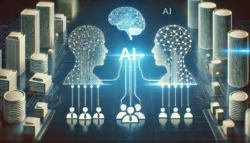
The integration of artificial intelligence (AI) into business is essential, especially for companies aiming to remain competitive. The business of mergers and acquisitions (M&A) is no exception. AI is already transforming M&A processes by increasing efficiency, mitigating risks, and uncovering new opportunities.
The high stakes challenges of M&A
Dealmakers are required to manage information and data of multiple stakeholders in high pressure, time sensitive environments. They must account for any number of risks, including ongoing geopolitical, regulatory, or financial uncertainties. In fact, risk assessment is expected to be the most challenging aspect of the deal process in the coming year.
Given the current environment, dealmaking is more complex than ever. Buyers are increasingly focused on conducting thorough due diligence and gaining deeper insights into target companies before moving forward. Sellers, in turn, are expected to provide greater transparency, reflecting a more discerning approach to dealmaking. The time required to prepare a deal has increased by 27% in the Americas in the first half of 2024 compared to the same period in 2023, while the time required to complete due diligence has also grown. Additionally, the volume of content in virtual data rooms—a critical component of the due diligence process—has surged significantly per deal compared to last year. Dealmakers have also said that unrealistic expectations around resourcing and bandwidth is the biggest reason why deals have fallen apart in the last two years.
AI in M&A
AI is helping dealmakers navigate these challenges. AI and and generative AI can automate many of the manual, time-consuming tasks that are critical to the due diligence process. For instance, AI can streamline the organization and categorization of files needed for review by investors or buyers, reducing human error and ensuring compliance with regulatory requirements.
By automating repetitive tasks, AI can also allow dealmakers to focus on strategic decisions. For instance, AI-powered redaction tools can accelerate the process of identifying, blocking, and unblocking sensitive information as a deal progresses, thereby streamlining document management and enhancing productivity. This automation enables dealmakers to allocate more time and resources to higher-value activities, ultimately improving the overall efficiency and effectiveness of the M&A process.
AI is also making other parts of the dealmaking process more efficient. One of the most critical steps in M&A is identifying potential targets. AI can assist in this process by analyzing datasets and market trends, which is particularly beneficial for companies pursuing programmatic M&A strategies. Some AI-powered tools can analyze anonymized private, paid and public data and other transaction activities within a secure platform, helping dealmakers identify better and faster deal targets.
In addition, AI can aid in the valuation process by providing objective analyses based on historical data and market factors. However, while AI enhances accuracy and efficiency in valuations, human judgment remains essential, particularly in evaluating qualitative factors and forecasting. The synergy between AI and human expertise is crucial for achieving balanced and informed decision-making.
Dealmakers want to use AI tools in the M&A process. In fact, two thirds of global dealmakers said exploring the use of new AI tools is their top area of operational focus next year, and most see increased productivity as a primary benefit of AI in their business, speeding up deals by as much as 50%. Yet there are some gaps that need to be bridged between AI knowledge and its application.
A significant amount of dealmakers say data security and privacy concerns are the biggest obstacles to incorporating AI into their businesses and a majority want the technology regulated.
AI adoption is increasing and dealmakers will need to ensure that their business models are primed to leverage it to gain a competitive edge. This involves not only integrating AI to increase efficiency but also applying sharper insights to improve deal outcomes. Achieving a balance between AI and human expertise is key to maximizing productivity and ensuring successful M&A transactions.
The post The Transformative Impact of AI on M&A Dealmaking appeared first on Unite.AI.

